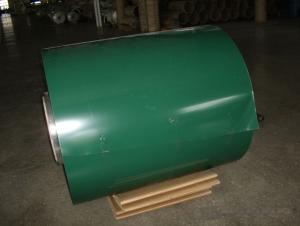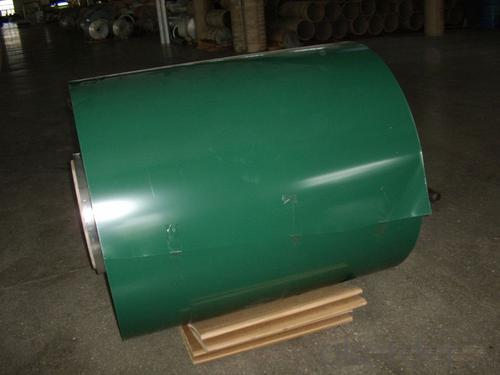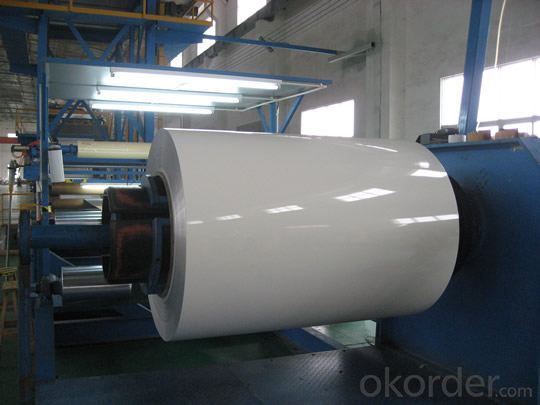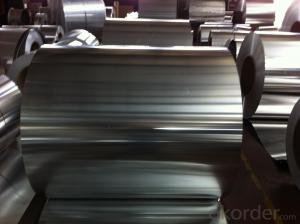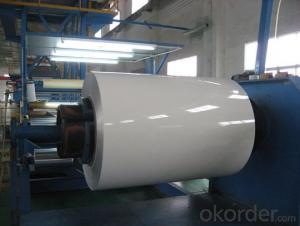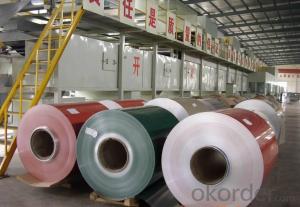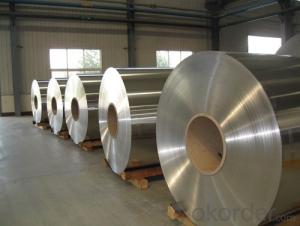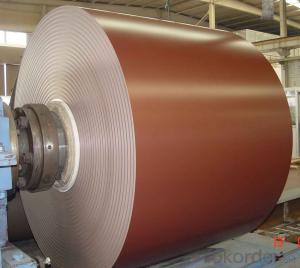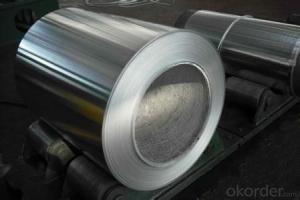Menards Aluminum Coil - Alloy 1100 PE Coated Aluminium Roll for Roofing/Ceiling/Gutter/Decoration
- Loading Port:
- Tianjin
- Payment Terms:
- TT OR LC
- Min Order Qty:
- 5 m.t.
- Supply Capability:
- 60000 m.t./month
OKorder Service Pledge
OKorder Financial Service
You Might Also Like
Specification
Alloy 1100 PE Coated Aluminium Roll for Roofing/Ceiling/Gutter/Decoration
Specification
Grade
| 1000 Series: 1050 1060 1070 1100 1200 1235 etc. 3000 Series: 3003 3004 3005 3104 3105 3A21 etc. 5000 Series: 5005 5052 5083 5086 5154 5182 5251 5754 etc. 6000 Series: 6061 6063 6082 6A02 etc. 8000 Series: 8006 8011 8079 etc. |
Thickness | 0.05~10mm |
Width | <1600mm< span=""> |
Color | Metallic, Solid, RAL or by customer requirements |
Coating paint: | PVDF(Polyvinylidene Fluoride), PE(Polyester ) |
Coating thickness | as per customer’s request |
Gloss | 10-90%(EN ISO-2813:1994) |
Total coating thick | Polyester18~25micron(EN ISO-2360:1995) PVDF25 ~35micron(EN ISO-2360:1995) |
Coating hardness | 2H |
Protective film | PVC film, Colorless transparent or White-black |
Adhesion | 5B (EN ISO-2409:1994) |
Impact resistance | No cracking and peeling (A.S.T.M D2794-1993) |
Flexibility (T-bend) | 0T- 2T |
Temper | H16, H18, H24, H26, H26 |
Certification | ISO9001:2000, CE, SGS |
Coil's standard diameter | 1100mm |
Inner Diameter | 405mm/505mm |
Coil's standard weight | 2000kgs |
Payment | L/C ,T/T |
Packing
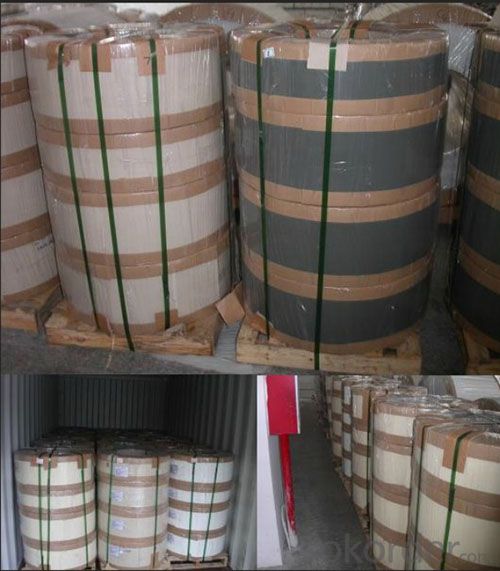
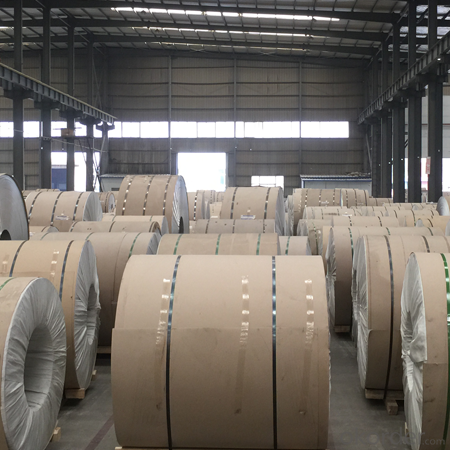
FAQ
Q: How can I request a product sample? A: The samples are free but freight should be collected. Please send sample list and courier account number by email.
Q: How can I request a product catalog? A: The hard copies of catalogs are free but freight should be collected. Please send courier account number by email. You are suggested to request a PDF catalog.
Q: Wha's your payment terms? A: One is T/T 30% before production and 70% against copy of B/L; the other is Irrevocable L/C 100% at sight.
Q: What's your trade terms? A: FOB, CNF(CFR), CIF, EXW.
Q: How long is the quality guarantee? A: All of our products have a period of quality guarantee since time of shipment. Please contact your salesman for more details, as different products enjoy different time of guarantee
- Q: How do aluminum coils contribute to recyclability in the construction industry?
- Aluminum coils contribute to recyclability in the construction industry by being made from a highly recyclable material. These coils can be easily melted down and reused to create new aluminum products, reducing the demand for virgin materials and minimizing waste. Additionally, aluminum coils are lightweight, making them more energy-efficient to transport and install, further reducing their environmental impact.
- Q: My mom was being an idiot and used the steel spatula to scrape the cookies off an aluminum cookie sheet. Now there are small bits of aluminum on the bottom of the cookies. I just ate a few of them (5) before i noticed it, should I be worried?
- It would only be a problem if you constantly expose yourself to aluminum filings. Heavy metals (things like lead or mercury) are toxic to people. What most people don't realize is that that in order for these metals to be toxic, you have to be exposed to them for a long period of time and in fairly large quantities. In general, lead is in your tap water. You've probably accidently drank more aluminum filings from soda cans than you have eaten from those cookies. Still though, there is no point in trying to expose yourself to something you know you shouldn't have in your body. So I wouldn't eat any more.
- Q: What advantages does 0.1*100cm aluminum coil have? Is it suitable for the roof tiling? How is the anti-oxidation and anti-corrosion performance?
- 0.1 aluminum sheet has no intensity, so 0.5-1mm colored steel is often used to make roofing.
- Q: Do aluminum coils require any special maintenance?
- Yes, aluminum coils do require special maintenance. Regular cleaning and inspection are necessary to ensure their optimal performance. This includes removing any debris or dirt buildup, checking for any signs of corrosion, and ensuring proper airflow around the coils. Additionally, it is important to follow manufacturer's recommendations for maintenance to prolong the lifespan of the coils.
- Q: What are the typical lead times for ordering aluminum coils?
- The typical lead times for ordering aluminum coils can vary depending on various factors such as the supplier, quantity ordered, and current market conditions. Generally, lead times can range from a few weeks to several months. For standard or readily available aluminum coil sizes and grades, lead times are usually shorter and can be fulfilled within a few weeks. This is because suppliers often maintain a certain level of inventory for popular products. However, for customized or specialty aluminum coils, lead times tend to be longer. This is because these coils may require specific dimensions, finishes, or alloys that are not readily available. The production process for such coils involves additional steps, such as casting, rolling, and surface treatments, which can extend the lead time. Additionally, market conditions and supplier capacities can also impact lead times. During periods of high demand or when there are supply chain disruptions, lead times for aluminum coils may increase. Conversely, during slower periods or when suppliers have excess capacity, lead times may be shorter. To get an accurate estimate of lead times, it is recommended to contact aluminum coil suppliers directly. They will be able to provide specific information based on their current production schedules and inventory levels.
- Q: Are aluminum coils resistant to chemicals?
- Yes, aluminum coils are generally resistant to chemicals. Aluminum has a natural oxide layer that forms on its surface, which provides a protective barrier against many chemicals. This oxide layer helps to prevent corrosion and degradation of the aluminum coils when exposed to different substances. However, it is important to note that some chemicals can still have an adverse effect on aluminum, particularly strong acids or alkalis. In such cases, additional protective coatings or treatments may be necessary to enhance the chemical resistance of the aluminum coils.
- Q: Can aluminum coils be used in the production of cans?
- Indeed, the utilization of aluminum coils is applicable in the manufacturing of cans. This versatile material, known for its exceptional attributes like its lightweight nature, durability, and ability to resist corrosion, finds extensive employment in the can-making industry. Typically, during the production procedure, aluminum coils are shaped into sheets and subsequently trimmed to achieve the desired dimensions and contours of the can. These sheets are then treated with coatings, printed upon, and processed into cans using a variety of techniques. Employing aluminum coils guarantees the creation of first-rate cans that are well-suited for packaging a wide range of beverages and food items.
- Q: Besides replacing all the aluminum wiring.
- First find out the Electrical Codes for your city or area. Some don't allow aluminum and you have to have it up to code. Give a call to your city building permit departing and just ask how to find out about the electrical codes for the city first and see if you can recover them, replace them or have an electrician do the work. Tell them you have a friend who is calling about buying a house that has aluminum wire outlets and don't give any information. Building codes may be listed on a town or county's web site or read up on it. Once you know what's allowed, you can decide what to do about it. remember, always be very careful with electricity.
- Q: How are aluminum coils annealed?
- Aluminum coils are annealed through a process called solution annealing. This involves heating the coils to a specific temperature and then rapidly cooling them. The purpose of annealing is to soften the aluminum, increase its ductility, and relieve any internal stresses.
- Q: Does anyone know of any men's deodorant that doesn't contain aluminum? It has to be strong, as I do sweat a lot.
- Both my Speed Stick Original Scent and Old Spice High Endurance Original contain no Aluminum. They are both deodorants, NOT antiperspirants, which work differently. Deodorants do not inhibit sweating, they just keep you from smelling funky from it. Hence the name DEodorant. Antiperspirants on the other hand DO inhibit sweating as well as keep you smelling fresh. They do so by clogging your pores! And if there is aluminum in it, it can cause irritation on some people. Most antiperspirants contain aluminum, most deodorants do not. Whichever you end up going with just read the back label.
Send your message to us
Menards Aluminum Coil - Alloy 1100 PE Coated Aluminium Roll for Roofing/Ceiling/Gutter/Decoration
- Loading Port:
- Tianjin
- Payment Terms:
- TT OR LC
- Min Order Qty:
- 5 m.t.
- Supply Capability:
- 60000 m.t./month
OKorder Service Pledge
OKorder Financial Service
Similar products
Hot products
Hot Searches
Related keywords
